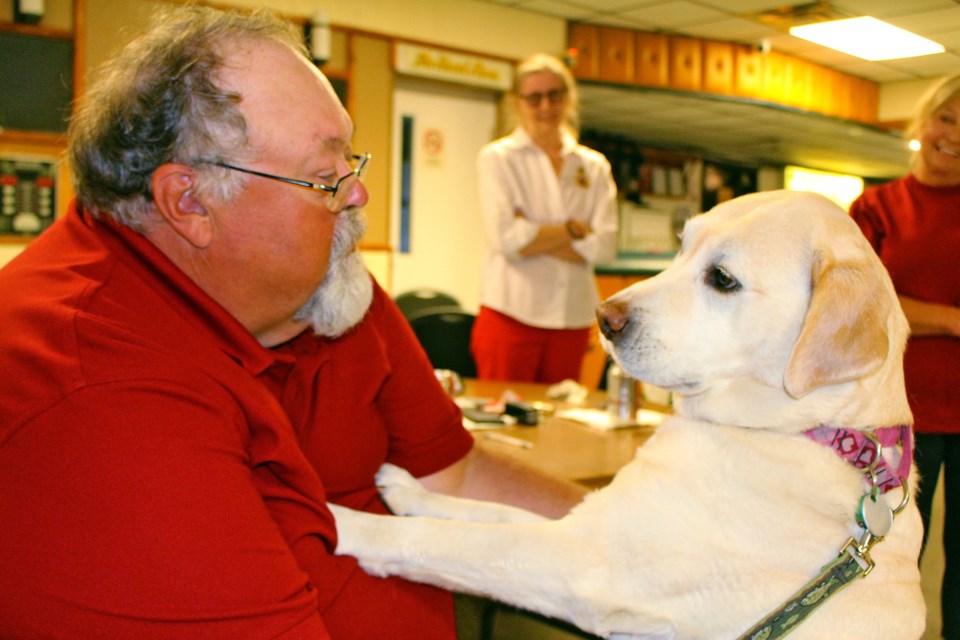On the morning of Oct. 6, 1986, Medric Cousineau woke up with an entire world of potential within his reach. By evening, the Atlantic Ocean would wash all that away.
Cousineau was a recent Royal Military College graduate, on a fast track in his career.
He'd married his bride less than a year to that day. Of that time, he said he was "living an adrenaline junkie's dream," a member of the Royal Canadian Air Force search and rescue team. More than three decades would pass before he would be rescued from the events of that night.
Two hundred miles off the coast of Newfoundland, his was the closest unit available when a mayday came through from an American longliner a further 300 miles away. Five crew members were injured on the longliner, two of them very seriously. Cousineau volunteered to be lowered from a Sea King helicopter onto the vessel at night, in a raging gale, when seas and swells topped 35 feet.
In an instant, while facing a wall of water in the darkness, Cousineau came to realize how very big the universe could be, and how small he was in comparison. A moment later, his body hit the back end of the boat with such force half his body went numb. Miraculously, he was able to rescue the two seriously injured Americans. For this act of heroism, he received the Star of Courage.
"I was awarded Canada's second highest award for bravery for what I had done out there that night and the consolation prize was that I developed PTSD," Cousineau said during a visit to Legion Branch 564 on July 16.
PTSD, or Post-Traumatic Stress Disorder, is a complicated diagnosis.
“In 1986, they didn't know how to spell it, let alone treat it,” Cousineau said. “For those of you who aren't aware, PTSD is one of the most complicated and complex mental health injuries that mental health clinicians have to face.
"Depression, anxiety, suicidal ideation, anger, rage, agoraphobia, dissociative episodes and a whole rack of different addictions, that's the kind of stuff that PTSD is.”
Re-experiencing the trauma through intrusive and distressing recollections of the event, flashbacks, and nightmares often impair sleep and daily functioning. Dissociation, emotional numbness and irritability can also challenge a person’s ability to socialize as one had before the traumatic event. Cousineau has lived with this injury for over 30 years.
For the majority of that time he isolated himself, spending most of his time living in what he calls his family’s “woodshed” outside of their home in Nova Scotia. Things changed when, in 2012, he discovered he could find relief for some of his symptoms with help from a service dog.
On Aug. 6 of that year, he met a dog named Thai that would change the rest of his life, and that of many others.
Within two weeks, Thai was waking Cousineau up from night terrors before they began. The changes in his sleep routine were a welcome relief to his wife and his daughter – who had never known her father before his injury and was “gobsmacked” by the improvement she witnessed.
Fast forward yet another few weeks and Cousineau began walking with his wife and his dog outdoors. On one of these walks, he came to the realization that he'd become absolutely convinced other veterans could be helped as he had been if provided with service dogs.
By 2013, Cousineau would walk 1,000 kms to Ottawa. He was joined by fellow veterans who also came to believe veterans diagnosed with PTSD should be paired with service dogs. That’s when he met Garry Pond, the first vice president of the Royal Canadian Legion Ontario Command (RCLOC).
“Ontario picked it up from there,” Pond said. “If someone went into duty and got hurt, we need to take care of them after they’re hurt and this is the way we can do it.”
On April 26, RCLOC partnered with Wounded Warriors Canada to create Operation Service Dog, announcing $225,000 in funding to connect veterans with dogs. A memorandum of understanding exists between these organizations for one year, and all Legion branches in Ontario will be canvassed with the program.
Pond is hopeful that all will help out.
While speaking about his experiences during a visit to the Lockerby Legion on Long Lake Road, Cousineau said that people often ask him what the cost of a service dog will be.
To that he answers, “I do not care.” People then ask, "Why don't you care?" To that he says, “The people who need them have already paid the price and they didn't ask before they did. Money is really a stupid reason to die and in some cases, that's what we're talking about. The work we're doing is to ensure that our veterans get the kind of help they need without having to say, 'I can't afford that.' ”
At one point in Cousineau's presentation at the Lockerby Legion, a 75-year-old veteran expressed interest in acquiring a service dog. The interest within the hall appeared to be high, and support of the initiative resulted in over $2,900 being donated by the branch in support of Operation Service Dog.
Asked why this program isn't being supported by Veterans Affairs Canada, Pond said the Legion is actively canvassing to see that happen. In the meantime, veterans are helping fellow veterans.
“We heard how Medric spoke about guys being in the basement, that's the way people live, that's the way they suffer, and we are here to help veterans. Our goal is to help get those veterans out of the basement (and) a service dog is one of the best ways to do that."
Pond said that anyone who would like to support Operation Service Dog may do so through the nearest Ontario Command Branch of the Royal Canadian Legion.
